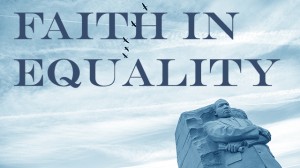On the Hill: Will Economic Justice Advocacy Save Religious Groups?
 Image via Brookings Institution. Click here to read more about their report.
Image via Brookings Institution. Click here to read more about their report. Congress is now done with its second week of recess, but the nation’s capital kept busy even while the senators and representatives were back home in their districts and states. I recently attended an event at the Brookings Institution called “Faith In Equality: Economic Justice and the Future of Religious Progressives” at which a report of the same name was released and members of the religious and political communities talked about the past and future of religious progressives and other religious traditions in the United States.
The panelists began by discussing the historical religious makeup of America and the typical political behavior of various religious traditions, while contrasting that perspective with modern views about religious individuals and the religiosity of political parties. E. J. Dionne, a fellow at Brookings and a professor at Georgetown University, brought up an interesting point that religious people have historically aligned themselves with a broad array of political parties, but that with the rise of the religious right in the 1980s most Americans now associate religious people with the Republican Party and conservative political causes. Gary Dorrien, a professor at the Union Theological Seminary, rightly pointed out that religious people have often been the leaders and supporters of social justice and progressive causes, participating in the civil rights and abolitionist movements, and have not always just been the base of the Republican Party.
While this historical perspective was interesting, I found that the panelists’ perspective on the decline of religiosity in the United States, and the affect that decline is having on political parties and certain advocacy causes, to be the most important. Dionne stated that American youth are experiencing a sort of “Europization” in that they are becoming increasingly secular or nonreligious like their counterparts across the Atlantic, with nearly 35 percent of Millennials identifying as nonreligious or not affiliated with a religious tradition. With this rise of the “nones” has come a corresponding shift in the politics of the major political parties, with Dionne claiming that the Democrats are now much more secular and willing to challenge religious interests than they were even a decade ago, with gay marriage and the Affordable Care Act’s contraception mandate being just two recent examples. Republicans, who haven’t experienced a huge growth in the number of “nones” in their party, have remained relatively defensive of religious rights because many of their constituents remain religious, and specifically Christian.
Dorrien also pointed out that the rise of the nones has coincided with a decrease in the number of religious progressives, like liberal Protestants, many of whom have joined the nonreligious community or left their church because of the association of conservative values with religion and the religious right. This religious flight was only worsened by the fact that many progressive religious traditions didn’t grow beyond their demographic origins and appeal to new types of people. However, Dorrien and the other panelists concluded that the religious right’s time is fast fading, and that the ideological diversity that previously categorized the religious community is returning. This movement away from conservative religious activism is promising to Dorrien because it will allow religious groups to turn away from divisive social issues and focus on economic justice, an issue which he claims has interreligious and cross-ideological appeal. More importantly, the panelists believe that economic justice advocacy, especially while unemployment and income inequality remain high, will appeal greatly to lapsed religious individuals and those who had never been a part of a religious community.
Pope Francis seemed to be the man of the moment at the event, as the panelists couldn’t stop talking about how his focus on economic justice had won popularity for the Catholic Church and re-legitimized religious activism, even though the Church hasn’t actually changed many of the divisive theological and social positions that it currently maintains. Still, by focusing on economic justice, the church and other religious institutions are uniting different communities, including the nonreligous community.
This event made clear to me that nonreligious and religiously unaffiliated Americans essentially own the future, and that most of the reason they will have this power is because of the unappealing advocacy work done by religious conservatives. While some nonbelievers hope for the enfeeblement of all religious traditions, I hope that progressive and conservative religious activists will focus on helping those in economic need rather than judging those marked “different” by society, because they will by joining humanist activists in working for the betterment of humankind. If such activity does end up restoring some of the religiosity of Americans then so be it, as these newly religious people will resemble the religious activists that fought against Jim Crow and not the ones who sought to ban abortions or legalize discrimination against people based on sexual orientation or gender identity.
